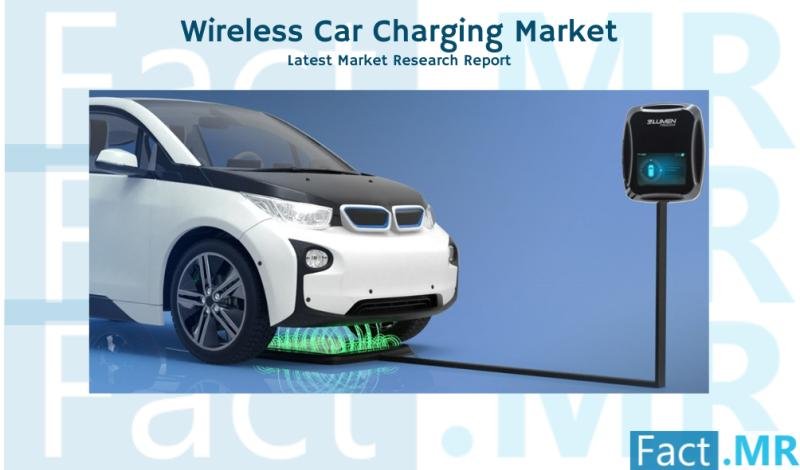The automotive world is on the brink of a revolution, and at its core is the rapid adoption of electric vehicles (EVs). As sustainability becomes a global priority, the demand for efficient and convenient charging solutions is escalating. This has paved the way for the rise of wireless car charging, an innovation set to transform the way we power our vehicles.
The size of the global Wireless Cars Charging Market is expected to be US$ 36.5 million in 2024 and US$ 13.8 billion by 2034, with a projected compound annual growth rate (CAGR) of 81% between 2024 and 2034.
Understanding Wireless Car Charging Technology
Wireless car charging eliminates the need for traditional plug-in chargers, offering a seamless and automated charging experience. Using inductive charging technology, energy is transferred from a charging pad to a receiver installed in the EV. As soon as the vehicle is parked over the pad, the charging process begins automatically, making it more convenient and efficient for drivers.
This technology enhances user-friendliness, particularly in urban environments where accessibility to charging stations can be a concern. With the rise of smart cities and intelligent transportation systems, wireless charging aligns with the vision of creating a more connected and effortless driving experience.
Get Free Sample Research Report:
https://www.factmr.com/connectus/sample?flag=S&rep_id=9616
Market Growth Driven by EV Adoption
The increasing demand for EVs is the primary driver of wireless charging system adoption. As the world shifts away from fossil fuels, electric mobility is gaining momentum. Governments across the globe are implementing strict emissions regulations, offering incentives, and investing in charging infrastructure to promote EV adoption.
Consumers are also recognizing the benefits of electric vehicles, such as lower operating costs, reduced carbon footprints, and technological advancements. However, one of the biggest challenges that EV owners face is charging convenience. Wireless car charging provides a solution by eliminating the need for manual plug-ins, reducing charging anxiety, and making EV ownership more appealing.
Advancements in Wireless Charging Technology
The wireless car charging market is evolving rapidly, with innovations focused on efficiency, speed, and reliability. One of the key advancements is the development of high-power transfer capabilities, which allow faster charging times. Modern wireless systems are designed to minimize energy losses, ensuring that more power reaches the battery.
Another breakthrough is the introduction of resonant inductive coupling, which enables energy transfer over greater distances. This advancement allows for better alignment between charging pads and vehicle receivers, making charging even more efficient.
Additionally, smart charging features are being integrated into wireless systems, enabling real-time monitoring, remote access, and energy management. These innovations are paving the way for a future where EVs can be charged wirelessly while on the move, further enhancing the convenience factor.
Regional Market Insights
As wireless car charging technology gains traction, different regions are experiencing varying levels of adoption. East Asia is expected to dominate the market, holding a 33.7% share by 2034. Countries like South Korea and China are investing heavily in EV infrastructure, creating a favorable environment for wireless charging solutions.
North America is also emerging as a key player, with sales of wireless car charging systems projected to reach US$ 9.4 million in 2024. The United States, in particular, is witnessing rapid growth, driven by increasing EV sales and a tech-savvy consumer base. By 2034, the U.S. market is expected to be worth US$ 2.74 billion.
Germany is leading Europe’s adoption of wireless car charging, with strong government support for EV infrastructure development. The country’s automotive industry is actively integrating wireless charging into new EV models, further accelerating adoption rates.
Meanwhile, Japan is making significant strides in wireless charging technology, with collaborations between automakers and tech companies fostering innovation. With a projected CAGR of 83.1%, Japan’s wireless car charging market is expected to reach US$ 1.39 billion by 2034.
Challenges Hindering Market Expansion
Despite its potential, the wireless car charging market faces some significant hurdles. The most pressing issue is the high initial capital investment required for infrastructure development. Establishing a widespread network of wireless charging stations demands substantial financial resources, making it a challenge for businesses and governments to justify the investment.
Another concern is standardization. Different automakers and technology providers are developing their own wireless charging solutions, leading to compatibility issues. Establishing global standards for wireless charging will be crucial for its widespread adoption.
Additionally, wireless charging efficiency is still being optimized. While advancements are being made, some energy is lost during transmission, making it slightly less efficient than traditional plug-in chargers. Continued research and development are needed to improve efficiency levels and make wireless charging a more viable option for all EV owners.
The Role of Startups in Disrupting the Market
Startups are playing a vital role in shaping the future of wireless car charging by introducing innovative solutions and forming strategic collaborations. Companies that focus on technological differentiation, such as enhancing charging efficiency and integrating AI-powered energy management systems, are likely to gain a competitive edge.
Many startups are also partnering with established automotive manufacturers to integrate wireless charging technology into new EV models. These collaborations are driving the standardization process and making wireless charging more accessible to consumers.
Browse Full Report @ https://www.factmr.com/report/wireless-car-charging-market
The Future of Wireless Car Charging
As technology continues to advance, the wireless car charging market is set for exponential growth. The introduction of dynamic wireless charging, which enables vehicles to charge while in motion, is one of the most anticipated developments in the industry. This innovation could eliminate range anxiety altogether, making EVs even more attractive to consumers.
Governments and private stakeholders are expected to increase investments in wireless charging infrastructure, making it a key component of future smart cities. As the automotive industry embraces electrification, wireless charging will play a pivotal role in enhancing the overall EV ownership experience.
Conclusion
Wireless car charging is no longer a futuristic concept; it is rapidly becoming a reality. With an estimated market value of US$ 13.8 billion by 2034, this technology is set to revolutionize how we charge electric vehicles. While challenges such as high costs and standardization remain, continuous advancements and growing EV adoption are driving the wireless charging market forward.
As innovation continues and infrastructure expands, wireless car charging will become a mainstream solution, making electric mobility more accessible, efficient, and convenient for drivers worldwide.
Recently Publish by FactMR Industry:
Cable Conduit Market:
https://www.factmr.com/report/cable-conduit-market
Email Tracking Software Market:
https://www.factmr.com/report/email-tracking-software-market
Label Classifier Market:
https://www.factmr.com/report/label-classifier-market
Virtual Schools Market:
https://www.factmr.com/report/virtual-schools-market
Contact:
US Sales Office :
11140 Rockville Pike
Suite 400
Rockville, MD 20852
United States
Tel: +1 (628) 251-1583
E-Mail: sales@factmr.com
About Fact.MR
We are a trusted research partner of 80% of fortune 1000 companies across the globe. We are consistently growing in the field of market research with more than 1000 reports published every year. The dedicated team of 400-plus analysts and consultants is committed to achieving the utmost level of our client’s satisfaction.
This release was published on openPR.


















